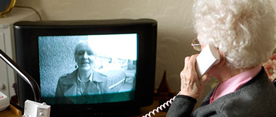Telecare
In recent years the development of remote care systems, known as ‘telecare’, have attracted much attention in terms not only of market development for devices, but also in the light of shrinking budgets and claims about the effect of population ageing.

Yet telecare systems for older people have largely been developed by industry or in service contexts where attention has been given to efficiency, while their social and ethical implications have been neglected. Governmental and industry claims that telecare enables older people to play a more active role in managing their own independence, health and well being, and this is part of a wider shift towards increasing peoples’ individual responsibility for their health. ‘Ageing-in-place’ underpins almost all government/local authority telecare programmes, an approach which involves staying ‘at home’ as long as possible. But telecare is inherently complex, and the largest group receiving home-based services is arguably one of Europe’s most vulnerable social groups, the oldest old.


 Through
Through  Celia and Maggie consolidated their findings by creating an ‘
Celia and Maggie consolidated their findings by creating an ‘ "They are seen as just technical people… they answer the calls, they make sure the right people go. But we found that they do a lot of caring work - they have to do complicated assessments of situations, and they’re sometimes on the phone to people in a crisis before the ambulance arrives, so actually they have this incredibly stressful job."
"They are seen as just technical people… they answer the calls, they make sure the right people go. But we found that they do a lot of caring work - they have to do complicated assessments of situations, and they’re sometimes on the phone to people in a crisis before the ambulance arrives, so actually they have this incredibly stressful job." Celia and Maggie’s aim is to have social and ethical considerations brought in early in the technology and service design process, rather than as an afterthought. They wanted it to be recognised that this technology is not just ‘a piece of kit’ but a whole new way of life, and should be taken seriously. Older people, they found, are very keen to participate in the design process. “It’s really hard to influence practice. Provision is becoming privatised… and cost savings are seen as very important. But local authorities are concerned and are listening.” AGE UK has just commissioned a knowledge transfer report about EFFORT. The project features on the AGE UK website, with a
Celia and Maggie’s aim is to have social and ethical considerations brought in early in the technology and service design process, rather than as an afterthought. They wanted it to be recognised that this technology is not just ‘a piece of kit’ but a whole new way of life, and should be taken seriously. Older people, they found, are very keen to participate in the design process. “It’s really hard to influence practice. Provision is becoming privatised… and cost savings are seen as very important. But local authorities are concerned and are listening.” AGE UK has just commissioned a knowledge transfer report about EFFORT. The project features on the AGE UK website, with a